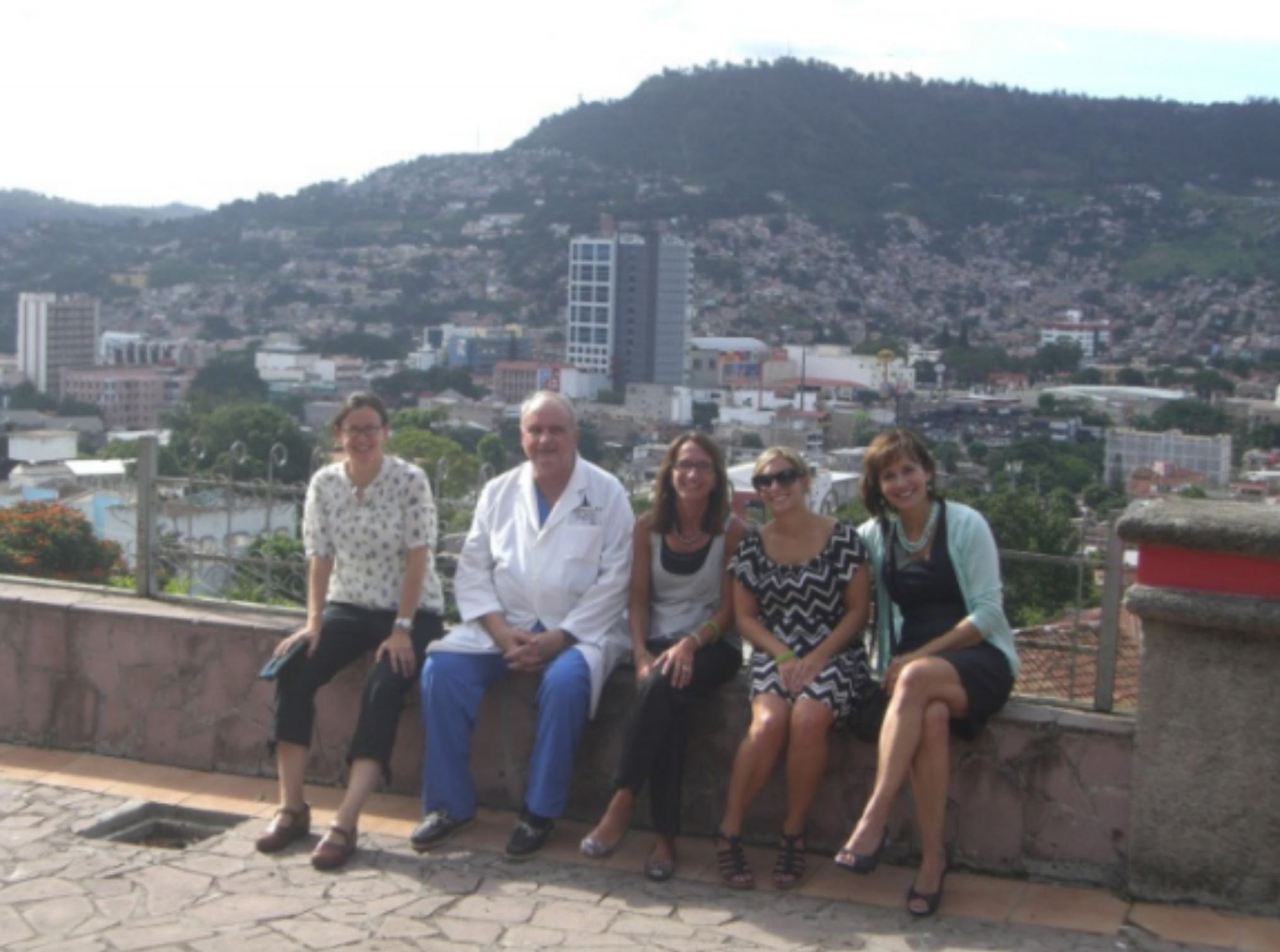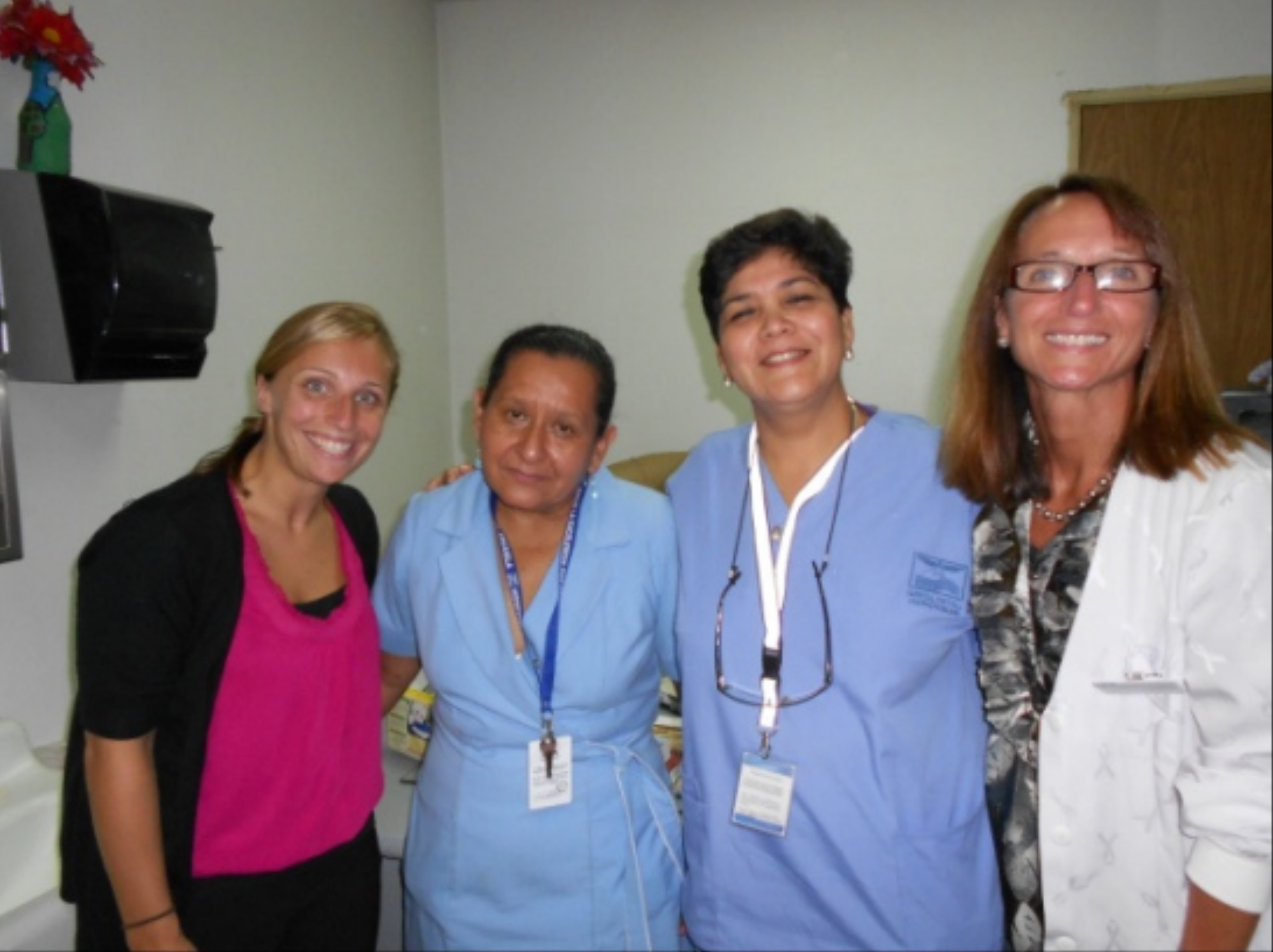Tegucigalpa, Honduras, July–August 2011
Lisa Kennedy Sheldon PhD, APRN-BC
Country of Service: Honduras
Dates of Assignment: July 31 – August 6, 2011
HVO, in conjunction with ASCO, sent its ninth and largest team to Tegucigalpa, Honduras, in August 2011.

The team was comprised of two advanced practice nurses, Julie Carlson, MS APRN AOCNS®, and myself as well as two gynecologic oncologists, Dr. Clifford Wheeless and Dr. Emily Berry. Julie’s daughter, a teacher in a bilingual school, Krista Carlson, also accompanied our team. Our hosts in Honduras were medical oncologist, Dr. Jose Angel Sanchez, and senior surgical oncology resident, Dr. Hoover Henriquez Cooper.
We were picked up at the hotel by Hoover who would be our main host, chauffeur, and source of information and pleasant conversation. Our hotel, the Portal Del Angel Hotel in Tegucigalpa, was a charming, boutique style hotel that was very personal and helpful. Continental breakfast was served every morning and meals were also available. The rooms were spacious and very clean. We could walk to local restaurants but were discouraged from traveling far on our own. The hotel has an armed guard and a gate.
The first evening we had dinner with Hoover and his wife, Karen, and met Dr. Jose Angel Sanchez (Angel) and his wife, Ludmilla. During the week, our meals at local restaurants were excellent and we dined on Peruvian, Japanese, Spanish and Italian cuisine. We did make sure to buy bottled water for use in our hotel rooms and daily drinking as well as to brush our teeth. We avoided uncooked vegetables including salad and only ate at establishments that our hosts recommended. Even with these precautions, two members of our team developed gastrointestinal problems for a day or two.
Angel Sanchez is an energetic, fun and visionary physician who wants to improve cancer care in Honduras. He had organized a busy schedule including daily rounds and surgery by our two physician members and a two-day conference for Honduran cancer nurses. As the first nurses on an HVO/ASCO team to Honduras, we spent the first three days learning about the healthcare system, educational programs for nurses and typical cancer care regimens.
Understanding the Honduran healthcare system is essential to grasping the limitations on cancer care. It is a two-tiered system: public hospitals where patients pay as they go, and private institutions for the wealthy. Most doctors work in both settings. Nurses also may work in both settings to supplement their income (about 12,000 USD after 30 years of work). We toured the largest public hospital in Honduras, Hospital San Felipe, and worked with the nurses in the chemotherapy infusion center. We also met the pharmacists and medical physicist in radiation oncology and were given a tour both these departments. We also visited the Hospital Escuela, the hospital associated with the medical and nursing schools, and worked with nurses on the special inpatient (“interna”) children’s wing, Hospital Para los Niño’s de Cancer, and the outpatient (“externa”) chemotherapy infusion center. Then, we visited the private military hospital outside Tegucigalpa and were stunned by the cleanliness of the facility and the private rooms with Honduran mahogany doors. We also had the opportunity to do medical rounds with Dr. Sanchez on the women’s medical ward and learn about the advanced stage and late diagnosis of many of the women. Given that cervical cancer has the highest prevalence, it is remarkable how few initiatives are in place to improve screening, early detection and promotion of vaccination programs. There is little in the way of formal hospice programs or palliative care teams to alleviate the symptoms of end-of-life.
Working with local doctors, medical students, residents and the Honduran Undersecretary for Health, we provided a two-day conference for Honduran nurses working in cancer care; the first conference of oncology nursing ever organized in Honduras. The attendance was double the expected number, 100 each day, a strong indication of the interest and need for more education and collaboration.

Cancer care, particularly chemotherapy, is delivered in very simple ways. While pharmacists wear gowns, masks, goggles, and triple gloves, oncology nurses wear one pair of latex gloves for hanging chemo and no gloves for IV insertion.
Additionally, there are no antiemetics given for home use other than intravenous odanasetron before chemo; a stunning problem given that many patients receive cisplatin and epirubicin in their regimens. Some patients even arrive with their own trashcans and towels for use when vomiting. We brought books on Cancer Basics, Quality of Life, Women’s Cancers and Chemotherapy/Biotherapy Guidelines from both the Oncology Nursing Society and Jones and Bartlett Publishers. The nurses at San Felipe and Hospital Esquela and Dr. Sanchez were very grateful for these donations even though the books were written in English.
Working with local doctors, medical students, residents and the Honduran Undersecretary for Health, we provided a two-day conference for Honduran nurses working in cancer care; the first conference of oncology nursing ever organized in Honduras. The attendance was double the expected number, 100 each day, a strong indication of the interest and need for more education and collaboration. Julie and I delivered 10 bilingual lectures during the conference using medical students as translators. Additionally, we collected data about the conference participants including demographic information, education, years in oncology, work settings, and educational needs for future program development as part of a study approved by the University of Massachusetts-Boston Institutional Review Board.
On the last night, Hoover took us for a trip to a local village for sightseeing and gift purchases followed by dinner in Santa Lucia. We were then taken out for a celebration of the successful week and conference. Angel and Dr. Selaya, the director of the hospital, presented each of us with certificates and were very appreciative of our time and efforts to improve cancer care in Honduras. It is clear that they want to improve cancer care and education by developing partnerships with organizations such as HVO and ASCO.
For more information on volunteering in Honduras, contact:
Danielle Stonehirsch
d.stonehirsch@hvousa.org
202-296-0928 x 18

